
views
X
Trustworthy Source
PubMed Central
Journal archive from the U.S. National Institutes of Health
Go to source
In addition, there are a variety of medical conditions and chronic diseases that could cause low ferritin levels. While low ferritin levels can cause serious health problems, in most cases it should be relatively easy for you to increase them. By determining any outstanding health problems, taking supplements, and altering your diet, you should be able to increase the ferritin levels in your blood.
Determining the Cause of Low Ferritin

Talk to a medical professional. Before you take any action to increase your ferritin levels, you should consult your doctor. Your doctor will ask you about your personal and family medical history. Your doctor will ask also you about whether you are experiencing any symptoms that could be associated with low ferritin levels. Some symptoms include: Fatigue Headache Irritability Hair loss Brittle fingernails Shortness of breath
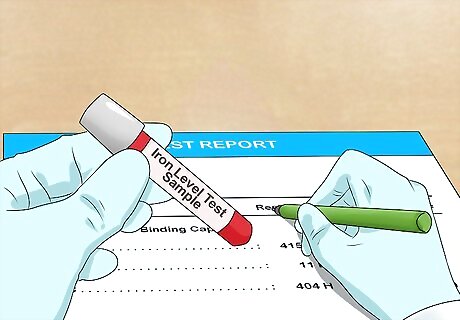
Test your iron levels in your blood. Since ferritin is iron that has been absorbed in your tissue, the first place your doctor will start is by checking how much iron is in your blood. This will give them a sense of whether you’re not consuming enough iron or may have a condition that inhibits absorption of iron into your blood. Iron is not absorbed as well when taken with calcium or calcium-containing foods like dairy, or with foods high in oxalates (such as spinach, kale, beets, rhubarb, chocolate, nuts, and wheat bran). Timing your iron intake with other foods will maximize the boost to your ferritin levels, especially if you are enjoying a vegetarian diet.
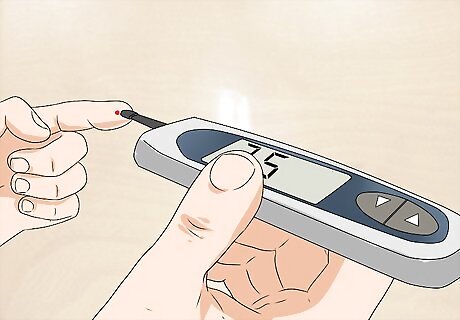
Check your ferritin levels. Your doctor will also test your ferritin levels. If you don’t have enough iron in your blood, your body may draw it out of your tissue, reducing your ferritin levels. As a result, ferritin level tests and iron level tests are often run together. Target ferritin levels in your blood should be between 30 and 40 ng/mL. Ferritin levels below 20 ng/mL are considered mildly deficient. And ferritin levels under 10 ng/mL are considered deficient. Some laboratories use unique procedures that impact the way they report ferritin levels and ranges, so always talk with a health care provider to interpret your results.
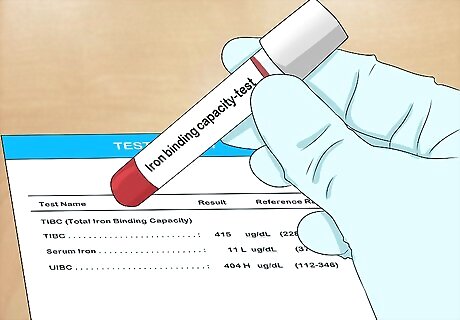
Submit to an iron binding capacity test. This test will measure the maximum amount of iron your blood can store. This will give your doctor an idea of whether your liver and other organs are functioning properly. If they’re not, then your low ferritin or low iron levels could be related to a larger problem.
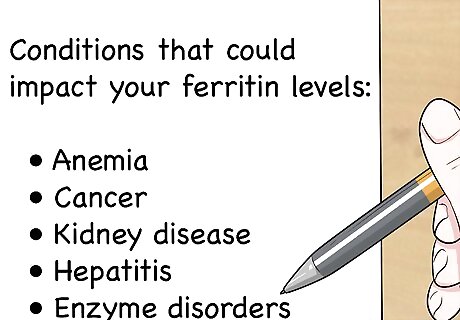
Determine if you have any serious medical conditions. After talking with you and running blood tests, your doctor will determine when you have medical conditions that have either caused low ferritin levels or may affect your ability to raise them. Conditions that could impact your ferritin levels or treatment include but are not limited to: Anemia Cancer Kidney disease Hepatitis Gastric ulcers Enzyme disorders
Taking Supplements
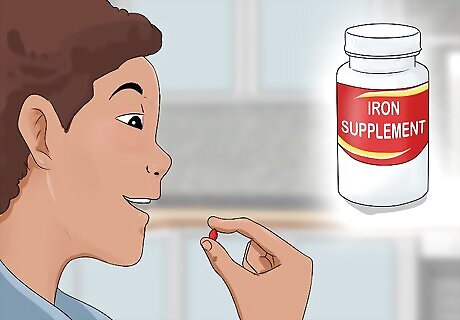
Take oral iron supplements. If you have a mild or moderate deficiency, your doctor will instruct you to buy iron supplements at your local grocery store or pharmacy. Follow the directions on the product or your physician’s instructions. Typically, oral iron supplements will take several weeks to raise iron and ferritin levels. Iron supplements may have a variety of side effects such as backache, chills, dizziness, headache, and nausea. Because vitamin C enhances iron absorption in the blood, you should take your iron supplement with a glass of orange juice. In general, iron from supplements is better absorbed when consumed with a food that contains vitamin C, such as a tomato or another citrus fruit. Avoid taking your iron supplement with milk, caffeine, antacids, or calcium supplements, which can reduce the iron absorption.
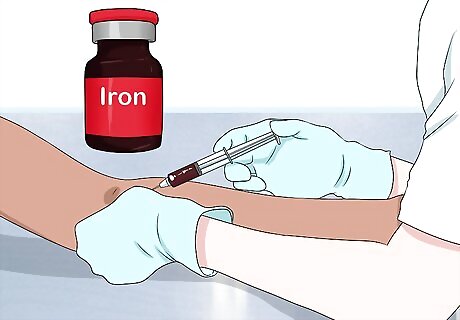
Receive vitamin injections and intravenous treatments. If you have a severe deficiency, have recently lost a lot of blood, or have a condition that disrupts your body’s ability to absorb iron, your doctor may prescribe injections or infusions. You may receive an injection of iron directly into your bloodstream or get an injection of B12 since this vitamin can help with iron absorption. In severe cases, your doctor may order a blood transfusion in order to restore iron levels quickly. Injections or infusions will only be used if other attempts to supplement iron and ferritin levels have failed. Iron injections may have side effects similar to oral supplements.
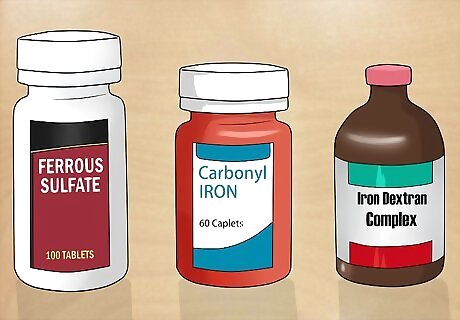
Rely on prescription supplements and medications. There are a variety of medications designed to increase iron and ferritin levels in the human body. If you have a condition that inhibits your ability to absorb or store iron, your doctor may prescribe one. Some medications include: Ferrous sulfate Ferrous gluconate Ferrous fumarate Carbonyl iron Iron dextran complex
Altering Your Diet
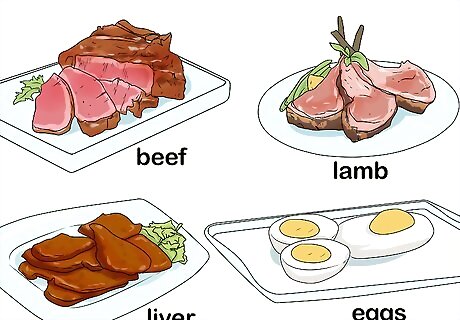
Eat more meat. Meat, specifically red meat, is perhaps the best source of iron you can eat. This is not only because meat is iron-rich, but because your body can more easily absorb iron from meat. As a result, by increasing your consumption of meat, you’ll also increase your iron and ferritin levels. The best meat products to increase your iron levels include: Beef Lamb Liver Shellfish Eggs
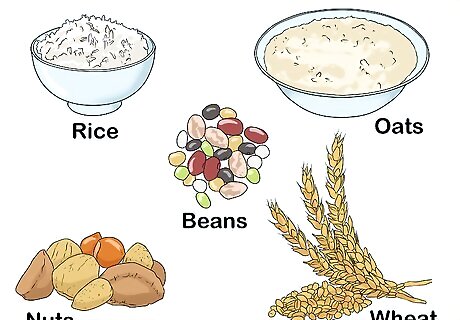
Consume plant products that have iron. Next to meat, there are a variety of plant products that are rich in iron. Consuming these plant products will help you to increase the ferritin levels in your blood. Remember, though, on average, you’ll need to consume double the amount of plant products to get the same iron you could from meat. Iron-rich plant products include: Spinach Wheat Oats Nuts Rice (when enriched) Beans
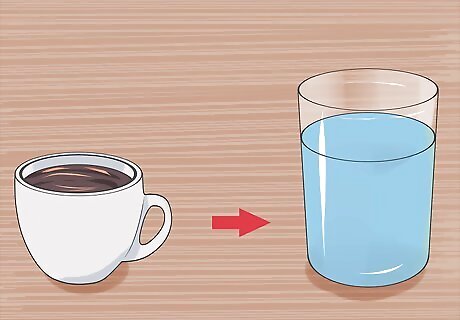
Consider limiting foods and minerals that make it hard for your body to absorb iron. Certain foods and minerals may make it more difficult for your body to digest and absorb iron. While it is not necessary to eliminate them from your diet, you might want to choose to consume less of these foods: Red wine Coffee Black and green tea Non-fermented soy Milk Calcium Magnesium Zinc Copper



















Comments
0 comment